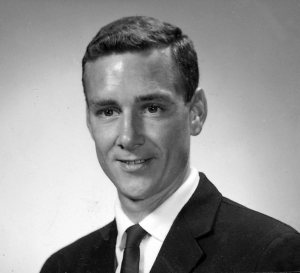Posthumous Award For Marathon Runner Who Broke World Record in Chiswick
Buddy Edelen, who ran at Chiswick Stadium in the sixties, gets into the Hall of Fame
Leonard “Buddy” Edelen, the American athlete who broke the world record for the marathon in Chiswick has been posthumously inducted into the USA Track & Field Hall of Fame on November 3.

Leonard “Buddy” Edelen
The marathon runner has links with Chiswick where he broke a world record.
On June 15, 1963, a sparse crowd at Chiswick Stadium near London watched Edelen win the Windsor-Chiswick “Polytechnic” Marathon in 2:14:28. Edelen’s time broke the world record held by Toru Terasawa of Japan.
It was 48 seconds faster than Abebe Bikila of Ethiopia ran to win the Rome Olympics in 1960. Edelen was the only American to hold the record between Albert Michelson in 1925 and Khalid Khannouchi in 2002.
According to an article in Runner's World, Buddy moved to Essex, England, in 1960, to work as a teacher and to learn from England’s racing environment, which was believed to be more rigorous at that time than anything in U.S. distance running.
In May 1964, he won the hilly Yonkers Marathon in humid heat, close to 100 degrees, by an extraordinary 20 minutes (more than three miles), in 2:24:25.6. Of 128 starters that day, 41 dropped out. That is felt by many to be Edelen’s greatest race.
It took a toll that probably cost him an Olympic medal according to the article. In Tokyo in 1964, Bikila won gold and the silver medal went to English man Basil Heatley, who earlier in the year had broken Edelen's record at the same Polytechnic Marathon race which was held two days before the anniversary of Edelen's win. Heatley's time was 2:13:55.
Edelen endured the Olympic marathon in October 1964 by tilting his body backwards to reduce intense sciatic pain, yet he managed to claw through the star-studded field to finish sixth.
According to the Runner's World article, Edelen came "too early" to be the United States' hero.
"In his years, Americans knew only track, so it was the blazing gold medal finishes by Billy Mills and Bob Schul that won their hearts, not a sixth place by a man who once broke a world record in an eccentric road race."
Was Edelen, who died of cancer in 1997 at age 59, embittered when Shorter, Bill Rodgers, and Joan Benoit Samuelson got the acclaim that passed him by? Sometimes he signed his correspondence with the words, “Buddy who?”
Edelen’s son, Brent, said his dad was excited with the 1992 publication of a book about him, A Cold Clear Day. The Athletic Biography of Buddy Edelen, by Frank Murphy.
“Yes, he would have liked recognition, but he was never negative,” Brent Edelen, who accepted the Hall of Fame award on his late father’s behalf, said last week. “He was everybody’s friend, droll, always joking, always optimistic. He even joked after he got cancer. He had huge admiration for other runners, especially Abebe Bikila, who won in Tokyo. I never heard a bad word from him about his running experience. He especially always loved England and English wit.”
The son remembers how his father gave away many of his awards and trophies in his later years, keeping the ones that mattered most to him and fit into his Olympic Games suitcase. “That’s where they were when he passed,” Brent Edelen said.
The second-generation Edelen was a good runner, too, earning a scholarship to Adams State University, and he still lives in Alamosa. But his running did not go beyond college. As with the Hall of Fame recognition, the real payoff for Buddy Edelen may be delayed a little longer.
“My young daughter, Frances, she’s the runner,” Brent Edelen said. “It’s early days, but she’s good. And she reminds me so much of my dad—same upright style, arms high, same quick stride. It’s unreal.”
November 11, 2016